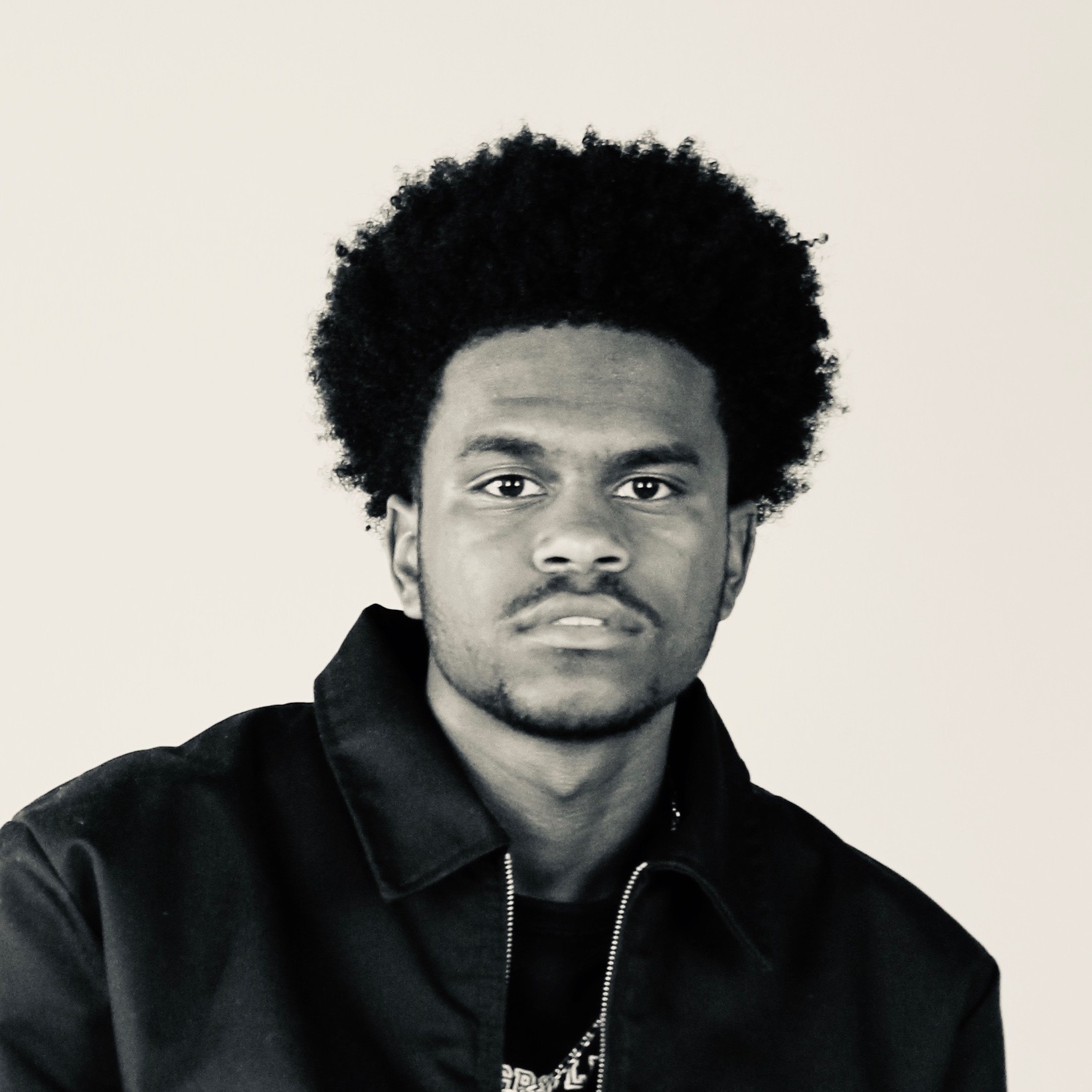I watched my movie with a filmmaking partner of mine, and I did what I could to laugh when it was time to laugh, smile when something called for a smile, and just overall be present while watching. But if you could peel back the first layer of my face to see a second one revealing how I truly felt, I’d probably be what it would look like if “cringey” was a person. Only because in my own time, I’ve watched my movie and broke it down like a playbook of self-creative/reflective criticism. Every scene has a misstep, every misstep has a flashback of how that misstep occurred, every flashback heightens my PTFD (Post traumatic film disorder). I’m addictive, especially when it involves a passion of mine, so when Ali, my partner, and I laid out this blueprint for MOORvision’s Future, we immediately got lost in the hustle, and have yet to come back out. Which causes us to indulge less in the fruits of our labor, knowing we haven’t went over to smell the fruit yet being too busy trying to make it the perfect basket. I don’t even think it’s hit him yet that he produced his first feature film. You get all the little flowers like “That shit was fire!”, “you guys did amazing work”, and “congrats bro you should be proud!”, but why does that never hold any weight as time goes by? It’s like a shot of validation that wears off, and once it’s gone, you fall right back into a sunken place of contemplation. It should honestly be diagnosed as an artistic illness… Maybe, Chronic creative anxiety? This is a bit of what mines sounds like.
“More cinematography, less dialogue. Even though “Bompton Had a Dream” is an adaptation of a play, and a lot of the style reflects that, I do feel as though I should’ve took a more visual storytelling approach. Around the time we wrapped our production, Majority studio films being released started using cinematography to say things they would’ve once written out in the dialogue, and it was honestly pleasing to see how much less exposition brought more life to a project. Then again, the sort of fly-on-the-wall feel I gave was perfect for how I wanted the viewer to digest this world. It wasn’t about making each scene action-packed and entertaining, it was about black humanity. Films are too busy romanticizing life anyway, and I can’t be apart of that de-humanization in my art. Fuck that. Sometimes your day is a slow walk to the park, some times you do have simple conversations that lead nowhere at all, and sometimes people are straight up awkward and it shows. But honest art is only appreciated when the honest artist can no longer speak up for it anymore, which is a conspiracy in itself, but besides that, I truly feel like I’m watching a revolving door with the same person just in different clothes walking out every other minute the way these films look and feel at times. But maybe this is just how they see the world as art, and like any industry subject to monopoly, tyranny, and specifically plutocrats. They intend to keep it that way. Fuck that. More dialogue, less cinematography if I say so.”
Should I go get checked out?
I was 16 and dropped out of high school when my mother forced me to write a play for the National NAACP ACT-SO Competition, a high school showcase for African-Americans to showcase their talents in every field you can think of. The category chosen for me, by my mother, was playwriting. I still remember her telling me: “This will be a good look for college.” But at the time, what is a college, if I can’t get through high school? Hopefully that can sort of visualize the effort level I gave this for you. Being damn near strapped down in chairs to write this thing, I finally finished the play, gave it to my mother, and never looked back at it. A few months later, the local competition held an award ceremony, and I won the gold medal, which meant I was going to the nationals. Didn’t know how I felt about it, in all honestly I thought maybe it was politics, and my mother paid off one of these people. Just to make me feel like I was good at anything in the world other than dribbling a basketball. I don’t know. But the national competition was a trip to Philly, for a week in a hotel full of accelerated young black minds, which at the time, I felt were all far more accelerated than mines, so there was no way I’d win anything on this level. But I end up walking across the stage that week, in-front of thousands, to accept another gold medal. That was the first time anything was actually unbelievable for me, even though I walked across that stage like I already knew the outcome. I finally felt like somebody other than that kid that gets kicked out of schools before he can even get sent a report card. I took that feeling and ran with it.
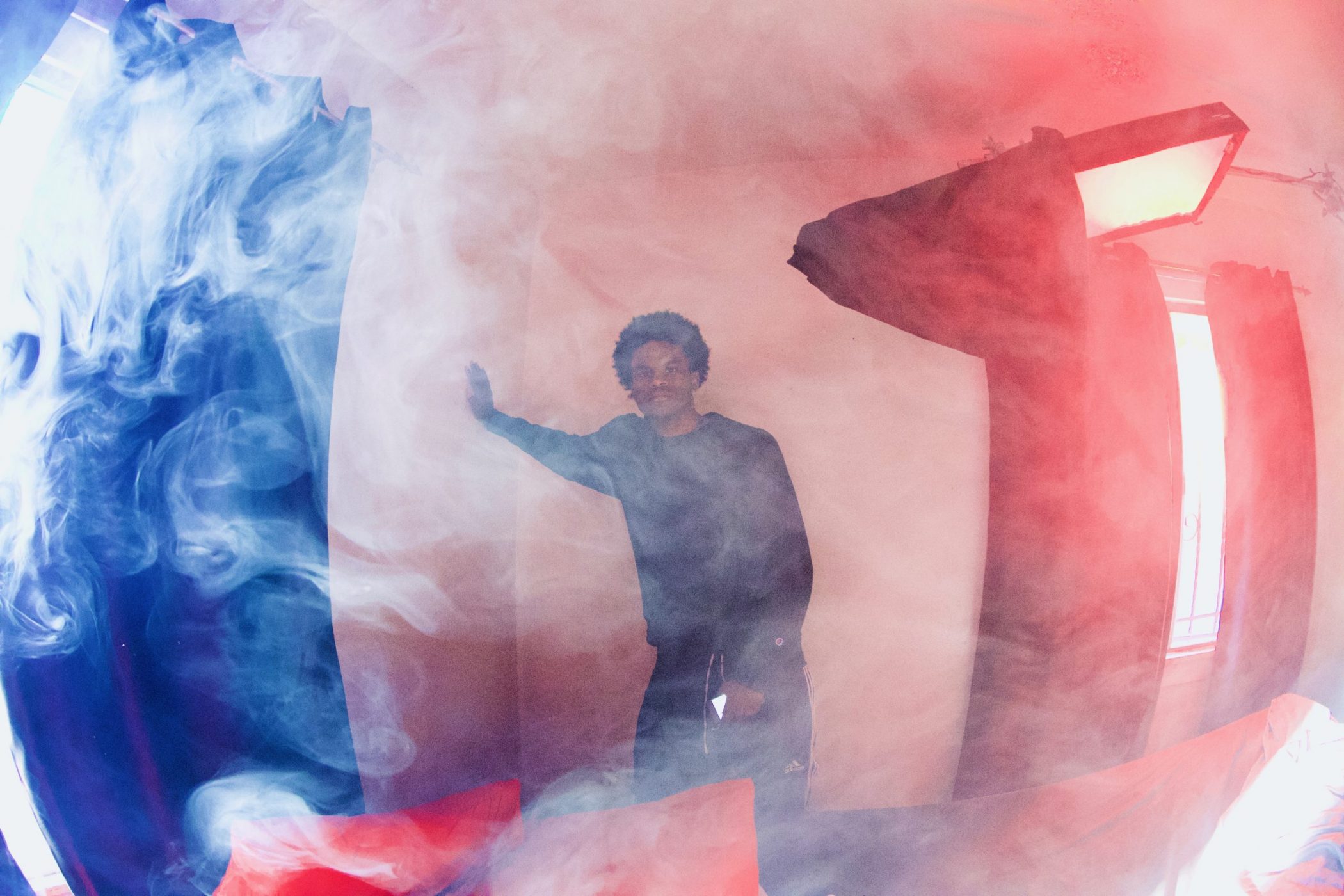
Fast forward four long, dark years, and I’m 20 years old, sitting on a couch in LA planning to shoot my first movie with no idea what the concept will be. To date, now a screenwriter making my directorial debut alongside my producer partner, Ali, who’s trusting me to bring the concept to life. I couldn’t think of any better debut than adapting my play “A Dream Deferred” to a feature film. This play was compelling due to the fact that is was a tale of my life story, a story that is a mere reflection of every black child that comes from struggle. Having questions, doubts, trauma, in which we hold on to for dear life. Do I have to play ball? Rap? Or hustle? Do I truly know myself as an African first, not an American? Will I be tied down to this concrete forever? Questions per every breathing second, like gasping for air while trying to actually see our reflection, knowing that if we don’t soon enough, all our families will see is us front-page, mugshot or gunshot. We hardly choose. Though we still somehow find beauty in pain, love, hate, survival. Taking whatever nature gives us and making a garden with it. So all I knew is this complexity had to be visualized, humanized, and sensitized. What better way to do it than my first movie. A project based in Compton, California titled “Bompton Had a Dream”, following Javon, a top high school basketball player on his commitment day, his little brother, Mel, who’s been courted on to Westside Piru and now is a product of gangland, along with the company they keep and rising conflict that comes with the territory. Doing everything I could to pay homage to the late great John Singleton (My favorite writer/director, unanimously) with my first project if it’s gonna be in LA. Through raw authenticity, trying to mirror his seamless beautification of the hood, since the media loves portraying us in an animal-like fashion. Why did we shoot the project in Compton? We don’t fuck with Hollywood & they tend to neglect these sections of America. Why is it titled Bompton? Because there’s a certain story we’re telling, and it was shot in a certain area of Compton that goes by “Bompton”.
I’m a film school dropout. Never shot a school project, but through networking I ended up building a production team with my partner, worked with some industry heads for next to nothing, and shot mini-projects, but nothing of our own that we fully curated with a significant budget from start to finish. No shorts, nothing. Ali and I had just been booted out of our first apartment together, both of us financially insufficient to survive in LA, when the idea sparked to hustle for an investment to make our first film. It was originally supposed to be a short, but I couldn’t find a way to write a revamped version of my play that was less than 90 pages, so we just said fuck it, it has to be a movie. We grew more and more passionate by the day about shooting a feature film, nothing less, even though it’s more that thought we were ready for that was Ali and I, no matter the outcome. Regardless of what all the conversations were like at the time for us… “Hey, good luck with whatever happens, but I don’t know about you guys shooting a movie before shooting a short, especially on a short film’s budget”. That’s life. But after locking a final script, our angel investor, who is a longtime friend of Ali and brother to me now as well, Petru, had seen enough promise in our work ethic and craft to invest in the project that would kick off our careers. It was a blessing, we knew all the work we put in would manifest, so that we could create without the industry’s involvement, allowing us to exercise our standards for MOORvision.
(Side note)
For those of you who don’t know… Yes, MOORvision is an Afrocentric name, in respect and reflection to the Moors of North & West Africa. African scholars that traveled to Europe in the dark ages of 711 AD, spreading their abundance of knowledge, empires, trade routes, etc. to other regions of the world, while countries were still elementary in these aspects, being the root for a lot of the worlds cultural values. Which is why we don’t mind being the first streaming network with an Afrocentric background in the company name. It translates the message we want to send through our energy and work, while building a community, in order to stand the test of time, and diversify this industry to give other ethnicities a voice, as well as a chance to make a name for themselves through film.
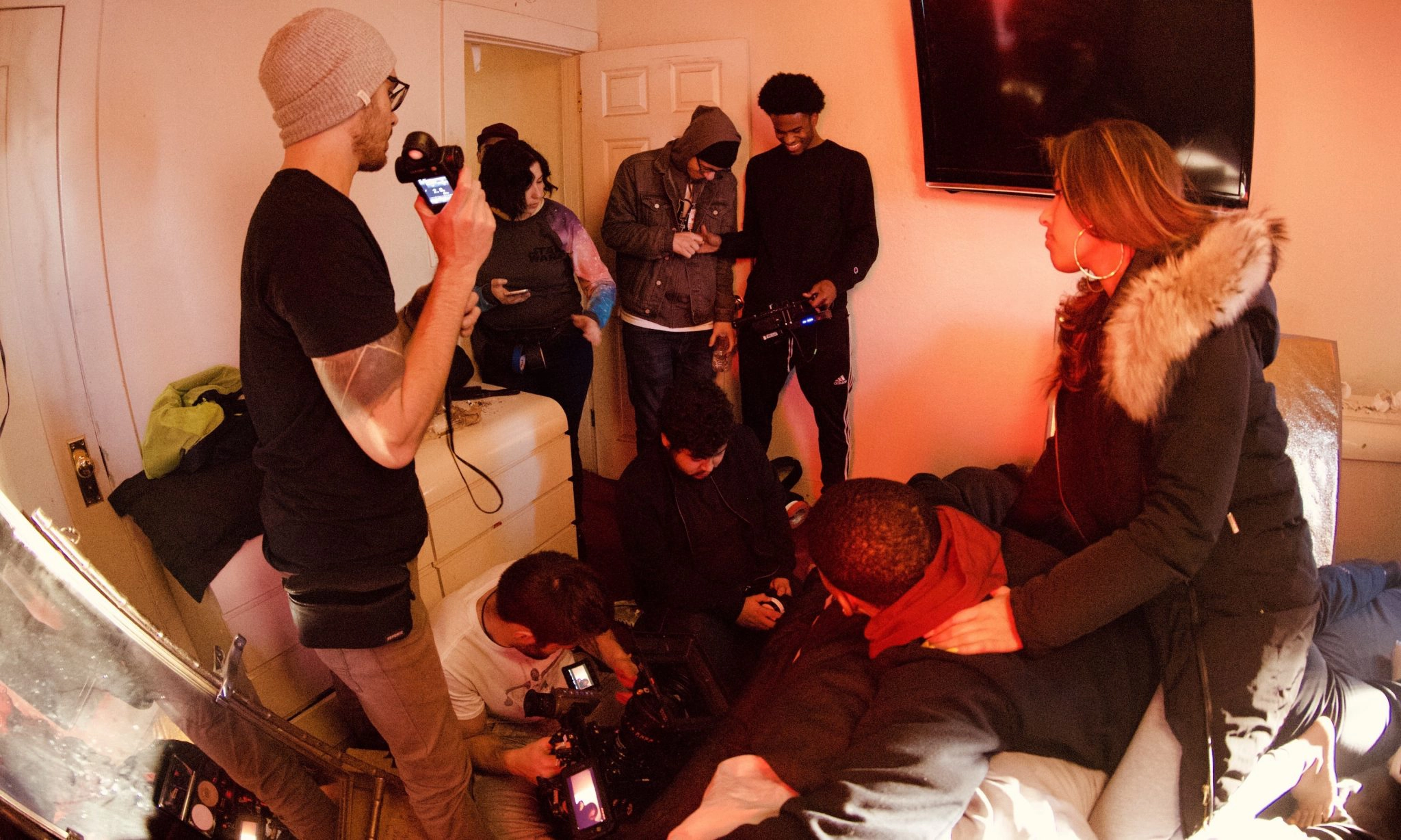
But back to starving artist-filmmaker language. Because of those sacrifices I made, such as dropping out of school and doing unpaid work, It left me in uncomfortable living situations, sleeping anywhere – couches, cars, benches, rooftops, you name it, I laid my head to rest on it. It was still no question whether or not we were going to put the entire budget into the project – we didn’t use a dime of that investment for anything personal. My whole identity was found outside of my comfort zone growing up, so this did affect my health & mental state at the time, but I trusted our vision.
I just wanna let this be known as well – ANYBODY CAN SHOOT A MOVIE… Have a vision, trust, and protect it by any means. Know the vision you have by visualizing it mentally, you won’t have a problem detailing the intricacies of the characters, world, and story plots. If you trust your vision, adjust to your film’s situation, critically think, and don’t look over your shoulder for anybody to save you. You will put the people you need in place to help bring it to life, and you will take a passenger seat in certain aspects when necessary, and learn. I didn’t write my shot list. Not because I didn’t know how to execute my vision through cinematography, but because I had to made the conscious decision to trust someone who dedicated his life to camerawork, that could knock out a clear visual structure, while I can prioritize the full plate left between Ali & I to finish in pre-production. We had to wear hats we never considered wearing – I directed, but also was my own script supervisor, production and costume designer. Ali produced, casted, was an assistant director at times, all types of shit. But more importantly, protect your vision by understanding the film business enough to not lose the intellectual property of your film while seeking distribution, licensing, etc. once the picture is locked (come to MOORvision). This should be your point of emphasis, cause I’m sure your heart will break after putting everything you had into a project, to then watch it slowly slip out of your hands to a company that just made one button push to take it away from you.
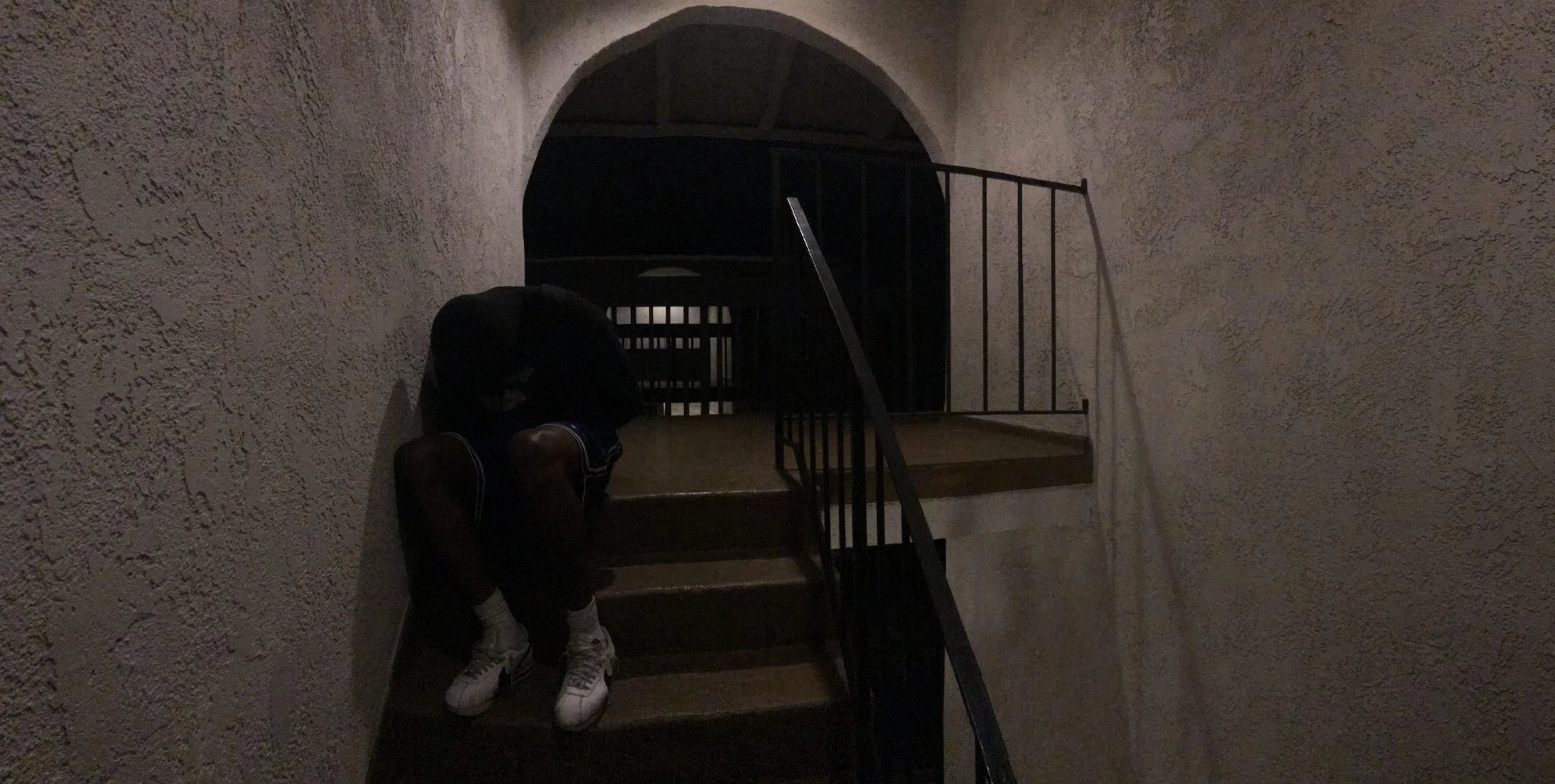
Now going into pre-production, I knew as the director I needed vocal points – something that I emphasized throughout the shoot to my cast & crew.
Cast: Don’t Act. If I caught you ACTING, it was a problem. Live in these moments when that camera is rolling, and be genuine to it. Everyone who got casted were chosen because they ARE the characters in their own unique way. Naturalism is something we noticed LA projects had been missing in the realm of mainstream media. So we wanted to shit on shows like “All American” and “On My Block” with our LA cultural depiction, to be blatantly honest with you. in my eyes it could always be better. I’ll just say for two people that aren’t from LA, but started our film journey here, we held it down.
Cast: Gain a theatre actors method. So much preparation goes into the rehearsal process for plays because when you get on that stage and it’s time to perform, you have no time to mess up or not know your lines. In theatre you get one long take, as I call it. So treat this film set like your stage, the camera and crew like your audience, and treat every shot like you get one take. Though if you’re gonna mess up, make us feel like it never happened.
Crew: Communicate. A shoot without communication is a shoot with no heartbeat. Which became our biggest misstep, being that it was the one thing our crew wasn’t keen on doing. Which is partially why the film ended up flatlining and had to be put on life support for a while. But, that fault falls directly on the shoulders of Rah & Ali, so we took that on the chin, coming out with an essential lesson: VET YOUR CREW. Don’t just put together a chunk of individuals who were affordable, make sure they are passionate about carrying this baby that is your project, don’t sit down with one potential crew member, then make a decision, sit down with at least five of them. Grow rapport with your cinematographer & editor as a unit at all times going into the project. Better yet, spend all the work or free time you have with them (coffee, a movie, video games, you get the point) because that crew will become your family for the entirety of your production and if you don’t love them or they don’t love you back, you will be walking on hot ass eggshells all day. Don’t get me wrong, you will all eventually hate each other during the process, because filmmaking is that mind-numbing and intense, but if it ain’t really love then bridges will be burned.
Casting for this project was probably the only time I could sit back and look around to say “Damn, we’re shooting a movie.” In my mind, we have actually arrived and nobody could tell us we haven’t, as much as we’ve been here mentally. It’s now tangible. But, I wanna take this time to state that if you are ever casting for a project, go on your IMDb Pro account and search the names “Alice-Jean Fraser & Ali-Han Ibragimov” if you need casting directors! They stretched their hands to make this independent project filled with such untapped talent by putting in the overtime needed. It definitely shows in the film now. But we still ultimately could never hold a full table read with the entire cast, because it wasn’t even fully casted until days before the shoot, due to hiring, firing, and persistently not finding exactly what we were looking for. But that didn’t mean I couldn’t intensify rehearsals with the individual character dynamics I already had to work with. My rehearsals took place in an apartment complex lobby, with one set of characters in a minuscule hot-ass workout room, others in the lobby, and one in the public kitchen. Rotating my time between the three. This went on the entire month prior to shooting, from around 10 at night till 4 or 5 each morning. With each cast member, I had a three stage rehearsal process that worked for me:
Conversation: it was absolutely imperative that I have healthy dialogue with my cast members before we even pick up a script, sometimes even stopping in the middle of rehearsal to simply talk. See where their heads are at for the time being, picking up on their natural expressions and tonality, also just letting them know I am here to listen and not just conduct. Which means everything to me, establishing a bond to where we can communicate freely with each other, not just on a “Director-to-Actor” basis.
Impromptu Improv: whenever I first started developing chemistry amongst actors that will have to portray long-time relationships on screen, I found myself making each group improvise a completely random scenario on the spot. For example (for those that have seen the movie), I would make Javon, Phoolie, and Saav play out Javon making it to the NBA Draft, and him bringing them to his private watch party. Now if you know any of those characters, then you can imagine how much they would run with that. Almost every time I did it with this cast, I couldn’t fix myself to yell “Cut” because they adapted so seamlessly to what I needed. Doing so, made each dynamic comfortable with one another, to the point where picking up a script & digesting lines, figuring out each other’s timing & pace didn’t take much time at all.
Scene Rehearsing: this is where things become surgical. Because these actors are supposed to come into that rehearsal as your actor, but leave as your vision. I adapted to having a checklist of things I started to consider and implement into my process:
How willing am I to adapt to the actor? I’ve casted multiple people with a natural cadence that can add a different element to the movie or their own character’s persona v. what I originally wrote.
What will the expression in this scene look and feel like as it flows into the next? Writing vs. molding the scene with the actors are two different experiences. The performance of each actor has to be accounted for in-sequence with the next, so the film’s tone doesn’t have an imbalance.
Always experiment. I couldn’t be afraid to throw a monkey wrench at my actors and approach the scene with a fresh mindset for a couple takes. It gave me something I didn’t even know I was looking for on multiple occasions.
Competing with my actors. I had to show them each day that I am more passionate about my work, so that can become contagious, or at least reflect on to them.
It’s okay to wear an actors shoes, sometimes. Some actors are very receptive to a director that can act out a couple scene lines for them, that way they can watch exactly what the director wants from them (not to say I did this often or was any good for that matter.)
Always give feedback, even when there is nothing to give. Actors often need some sort of confirmation, or approval from the director. After all, it is your vision, so even a simple “That was beautiful, let’s run it again” is always better than just “let’s run it again.”
Once I figured this out for myself, I got what I wanted, and still ended up having to reshoot certain scenes because I didn’t get what I needed. Huge difference.
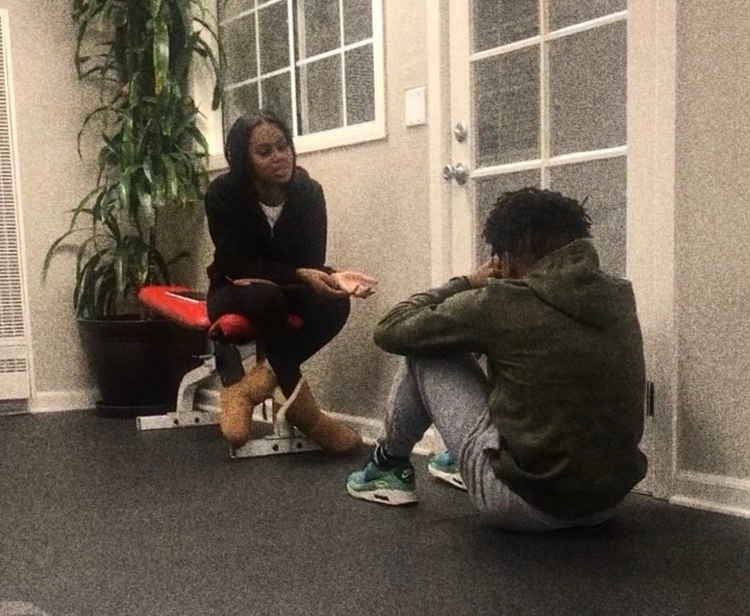
Production stages as the director will tell you who you are real quick. Also what approaches you may have or developed.
Approaches I grew to recognize:
Do you favor run & gun shooting? Being spontaneous on-set with your shots even though you’ve structured a whole shot list, having a crew that can work up-tempo, approaching a shoot in which ever way you feel.
Are you standard? Taking a template right from a book in “Filmmaking 101” to progress your film, or simply can’t stand an unorthodox shoot.
Are you an Actor’s Director? Or a Crew’s Director? Or are you versatile enough for both world’s on-set? Some directors naturally gravitate to their actors more than the crew, others love and know cameras just as much as the Director of Photography. Then there are those directors that can find that perfect balance with experience to become versatile, which I think we all eventually grow into.
Are you a cold or warm-hearted filmmaker? Are you both when you have to be?
I’ve seen some cold ass filmmakers, who had attitude that didn’t have work ethic to back it up, but when they do back up that energy, It’s nothing short of admirable. Warm-hearted can cause for an overly playful set, so if anyone is a warm person they must know when to be cold for a good balance, plus there are filmmakers who genuinely may never work with you because they cringe at people who have fun on-set. Because this is how they feed their families and it could come off slightly unprofessional, in their eyes.
Whatever you may be, knowing these things are crucial, because the producer is gonna have to hire a crew that suits you, or even on most independent projects you will have to know what and who you are looking for in the crew yourself. Which was unfortunate for me, because I didn’t know any of this about myself till after this project.
I’m extremely spontaneous & free with my storytelling, to the point where I re-imagine entire sequences and shots on-the-fly, 99.9% of the time it ends up being more creative that way for me, so it’s mandatory my crew can respect that enough to run & gun with me. I admire the shit out of the actors craft. Almost to the point where my acting debut may be coming soon, so I will always be an Actor’s Director. But this project made me fall in love with cinematography in ways I never knew I could, so versatility is a focal point for me moving forward. The first set I was ever on with Ali was directed by someone who was certainly cold-hearted, and the set felt cold because of it. I want the process to feel alive, vibrant, and like a creative space for everybody, I need my cast & crew to feel they can voice anything to me, garnering respect never been a problem for me, because I’ll always reach my hand out in respect to those around me first. Everyone is working to make this body of work function by playing their part, I’m not just the captain of some ship, I treat this like an anatomy. If the set isn’t like this it will most likely cause me discomfort and I turn cold in a heartbeat, in response.
So I might just be a warm-hearted, run & gun actor’s director, and it took my debut feature for me to realize that.
What my style had birthed in this shooting process, for one, was that if I said “cut” and it followed with me screaming from the pit of my chest “I LOVE WHAT THE FUCK I DO!” then the cast and crew knew we got the take we needed, and it’s time to move on. A good amount of scenes between Javon, Phoolie, and Saav were improvised because I realized they were just in their element when they’re let loose. Chemistry is a virtue in acting, so I let it be. Giving them dialogue points they had to hit, from the start to the end, but other than that, they were like firecrackers the second I called action. I mean, even after I said cut they wouldn’t know how to stop cracking jokes either, so it was what it was, creation is spontaneous like that. We probably had one of the youngest sets producing a movie in LA in the history of filmmaking, so we had fun with it. Although, what I’d say meant the most to me during the shoot, has to be the love and unity I saw from the Community of Compton. Some homeowners made the whole set lunches, random folks would constantly walk up to us trying to get involved, and we would do what we can to figure out how we can make that happen. We got high school teachers, community leaders, and gang members who probably never had thoughts of even being in a movie, to make their acting debuts in our project. We’ve built relationships with people that know they can call on us for anything throughout this process, and I don’t think for a second we should’ve took our project elsewhere.
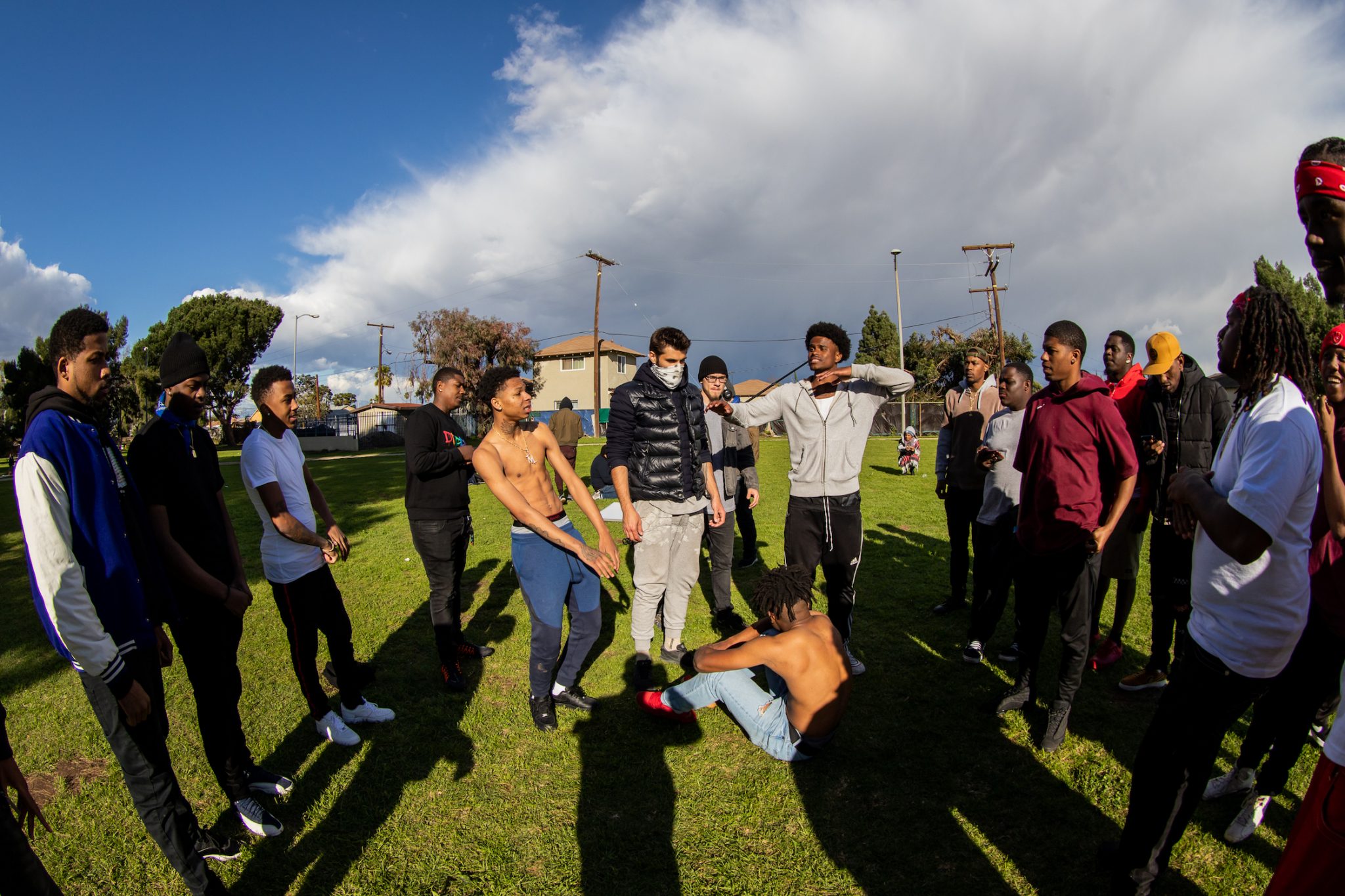
Post-production… Take one second to acknowledge the fact that you finished shooting the movie and completely lock in for this final piece to the puzzle. Because you most definitely will need to know what you want done and how you want it. Cause if not, your project will be eaten alive. We tried to hire editors that worked remotely, but it wasn’t panning out time or visual-wise the way we thought it would. Eventually we stumbled upon an editor who could sit side-by-side with us for hours each week, until the project got done (shoutout to David Rivera). Fortunately, we knew what we wanted, and pieced together the whole movie in two days. For anyone who knows the editing process, yes, this was actually possible. An editor we worked with prior to David, had all the scenes/takes placed in a picture-perfect labeling system (shoutout to Dave Eichborn), so when we got to sit down in front of it all, the workflow was very smooth. Other than that, our first shoot only got 70% of the project done, so we pieced together everything we had, and it also allowed me to see all the scenes I thought were immaculate, turn to shit in my eyes. Not because I grew weary after seeing the same footage a thousand times, that’s a myth by the way, but because I saw scenes that didn’t reflect a consistent style I wanted to uphold. So our next shoot turned into a reshoot for a multitude of scenes. Reshooting under different circumstances, less pressure, with a refined crew, and already committed actors, ran very smooth. Knocked that out and pieced together the whole puzzle, now all that was left is the other shit they don’t tell you as an independent creator, that you can do by yourself if need be, and don’t necessarily have to come out of pocket for:
1. If you can find help in the departments you need to shoot a film, you can find someone to lend you a camera to shoot your cover photo.
2. If you don’t know any graphic designers to enhance your cover art, I promise you, there are even public libraries that have computers where you can access photo-editing software.
3. Do you have a background in music production or generally can download music producing apps? Then that means you already have what it takes to learn and do the post-sound for your movie. But if not, there are plenty royalty-free instrumental websites that you can build a complete sound with (or just go on YouTube)
4. Wanna tweak certain things you don’t like about your editors cut? There are plenty tutorials and plenty computer rental companies to shape your vision. (Or iMovie)
5. Need a cinematic movie trailer? Watch trailers of movies that resemble yours, build a script of footage you wanna use, get some sound effects, and get to work.
6. Don’t have a budget to pay PR’s, Self-distribution, and digital marketing companies for your release? Think about all the unique ways you can promote your film, learn how to graphic design, video edit, run paid ads, and start your own promotional campaign.
7. Want to sell merchandise and ancillaries like shirts and posters but don’t wanna go through print shops? Go through a self-fulfillment site that will handle the designs and shipping for you (Shopify, printful, etc.)
8. Want to run a limited theatrical release but a major chain cost too much? Reach out to all the local independent theaters or people you know who own small businesses and strike a deal to play it there.
9. Need to distribute your film online but don’t know how to enter film festivals or get to streaming networks? Welcome to MOORvision.com
Ali’s overseas, I’m in America, we sat on FaceTime all night, every night editing the entire trailer from separate computers ourselves, till we got the final cut we loved. I took the camera from my photographer, climbed on top of a hoop and sat on the rim for that photo on our cover, and Ali did the cover art. Our website needed to be updated, a site that was built through coding which was a hired job, but Ali did what he could to learn coding and site-building to refine everything. We had to fix certain editing errors our editor made days before the release, but we couldn’t bring him back the hard drive to touch it up, so we got right on it ourselves. Ali edited and designed all-sound for the whole movie in two days, after our sound guy dropped out right before the release. We build all the content you see on our media pages ourselves from graphic designing, editing, to promotions, everyday. Saying all this not to be boisterous, but we are a living testament that if you trust your vision, there is nothing that should be able to stop you.
The first question was how will we get funding?
The next question was how will we get a full movie done?
The next question was how will we distribute it?
Trust your vision.
